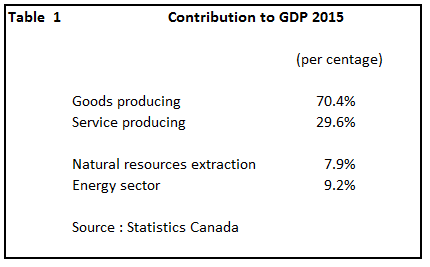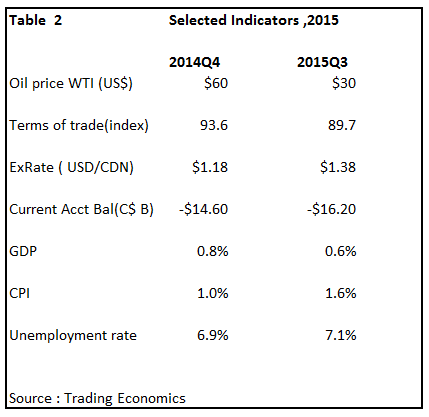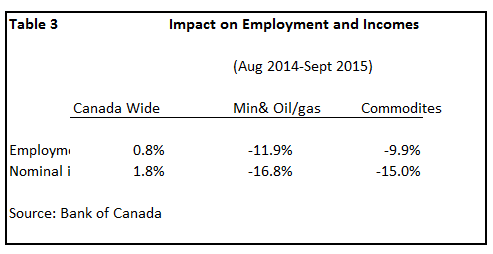What does the oil price collapse mean for Canada? A simple question with an the answer that is anything but simple. As the Governor of the Bank of Canada (BoC), stated the "oil price shock is complex because it sets in motion several forces " that will alter the path of Canada's economic future. The Governor goes on to argue that "it may take up to three years for the full economic impact to be felt, and even longer for all of the structural adjustments to take place.” Just what are the structural and time factors that we need to understand as we adjust to the new environment of lower commodity prices?
We start out by considering the structure of the Canadian economy. This will help identify how the various sectors of the economy will be impacted in the future. Broadly speaking, Canada is a service-based economy (70% of output) and only selectively a goods-producing country (30%). The largest component of services is the finance, insurance and real estate (FIRE) which now comprises about 20% of national income. These industries surpass the contribution of mining, oil/gas and energy distribution (17%) and manufacturing (10%). The strength of the services sector blunts much of the pain of falling oil prices.

Immediate Impacts of the Oil Price Collapse
Taking a snapshot of what has happened in the past 12 months, we note in Table 2 that:
- Oil prices declined by 40% in 2015, the Canadian dollar sank another 20%, on top of a 20% drop in 2014. The currency bore the greatest adjustment ;
- The currency devaluation did not, however, affect trade picture. The current account balance remained deep in negative territory;
- National output clocked in at a dismal rate of less than 1%;
- The rate of inflation accelerated due to the falling currency and its impact on basic imports, especially food products; and,
- Unemployment remained steady at around 7% for the year 2015.

Viewed from a national perspective, the oil price collapse has had a marginal impact on the economy during 2015. The burden of adjustment has fallen almost exclusively on the exchange rate; most other indicators have not change appreciably. However, below the surface, we are seeing evidence of the deteriorating conditions.
Within the resource sector, employment declined by 9-12% and incomes have fallen as much as 15-16% ( Table 3). More importantly for the future, the cumulative decline in business investment in this period was 8% and, in the case of engineering structures, (related to resource development) the decline was 13%.

The dominance of the service sector and other non-energy goods producing industries allows for national income and jobs to remain in positive territory. In other words, the impact of falling oil prices has, temporarily, been confined to the resource sector and to its geographic centre. The emphasis is on temporarily since there are longer term consequences facing the country as it comes to terms with the worldwide deflation in commodity prices.
Longer Run Adjustments
Research staff at the Bank assessed the path of economic growth over the next 3-5 years assuming that commodity prices remain at current levels.(1) Theirs is an attempt to map out the path the economy would likely take, given the new reality of low commodity prices..
The analysis sets a control" scenario in which commodity prices remain at mid-2014 level. Results are then measured against the "control" scenario. Thus, an outcome that is “lower” implies it is lower than in the "control "case, not that it is lower in absolute terms. By the end of 2020 we can expect that:
- capital investment in the commodities sector to be lower , reducing the economy's buildup of productive capacity; this results in a lower potential GDP growth rate;
- the share of commodities in the economy will decline toward the pre-boom levels of 2002;
- exports as a share of national income will be lower due to the decrease in the terms of trade;
- domestically, households will gradually adjust to lower wealth and incomes; and
- personal consumption will be lower, reflecting the reduction in incomes.
These outcomes strongly indicate that it will take much longer to absorb the current excess capacity. Investment, consumption and overall growth will be lower than had the oil prices not collapsed . Simply put, the road to recovery has now become longer and steeper.
